Best fleet management software of 2025
Make managing a fleet of vehicles easier

We list the best fleet management software, to make it simple and easy to manage your fleet of vehicles.
Any business that oversees a large fleet can attest to how complex and time-consuming fleet management can be - if you don't have the right tools. Fortunately, there are several types of fleet management software (FMS) platforms that aim to make the job a lot better to manage.
Businesses can use fleet management software to manage all mobile assets, covering everything from GPS fleet tracking to maintenance. This not only makes management easier, but can also help increase productivity, cut costs, meet demands faster, and better analyze market trends.
The daily operations and financial profitability of your company can both be considerably enhanced by the appropriate fleet management software. In fact, according to a survey conducted by FMS supplier Teletrac Navman, 55% of participants were able to cut costs and keep assets and drivers safer thanks to driver monitoring (32%), speed prevention (26%), and fatigue monitoring (30%); all of which are popular elements of fleet management software.
Our comprehensive guide will help you better grasp the key features and identify the provider and plan that would best suit your needs if you're looking for the finest FMS to manage your mobile assets.
Read up on how to choose the best fleet management software for your business
Samsara's fleet management software provides an instant view of vehicle location, traffic, and routes, with automatic updates for customers on arrival times and delays. It also offers live vehicle tracking and immediate alerts when vehicles and assets enter or exit locations for enhanced fleet visibility and management.
Preferred partner (What does this mean?)
We've listed the best Computerized Maintenance Management Systems.
The best fleet management software of 2025 in full:
Why you can trust TechRadar
Best fleet management software for integrations
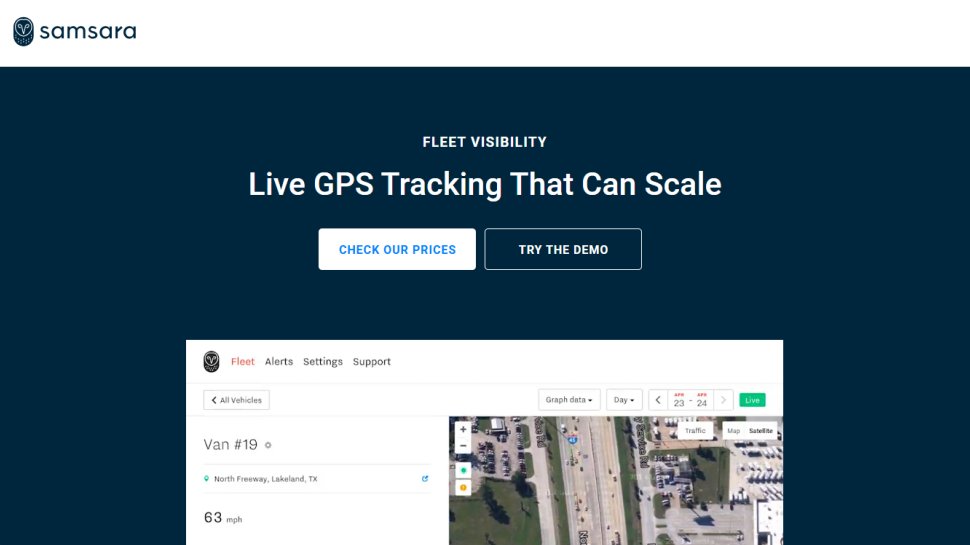
Reasons to buy
Reasons to avoid
With more than 15,000 clients since its establishment in 2015, Samsara has quickly risen to the top of the fleet management industry worldwide. Why? Users of Samsara have access to extensive tracking statistics and real-time vehicle monitoring thanks to a variety of high-quality trackers and AI-enhanced software. While managing the status and operations of the fleet, these tools assist fleet managers in reducing costs and idling time.
Better route suggestions help drivers, and administrators can simply keep an eye on driver behavior to reduce unscheduled pauses, control speeding, organize assistance in the event of an accident or breakdown, and even keep an eye on fuel consumption. All of these are made possible by in-depth real-time car diagnostics.
The sheer number of hardware integrations that are possible with the Samsara, such as dash cams, wireless sensors, and third-party software, is one of its biggest benefits. There are several interfaces available, including those for payroll, customer relations management (CRM), transportation management software (TMS), route planning, inventory management, fuel cards, and more.
The acclaimed customer service team at Samsara is accessible via a customer support portal on a 24/7 basis. You can start by finding answers to common questions in a FAQ and a knowledge base with video content.
Read our full Samsara review.
Best fleet management software for analytics
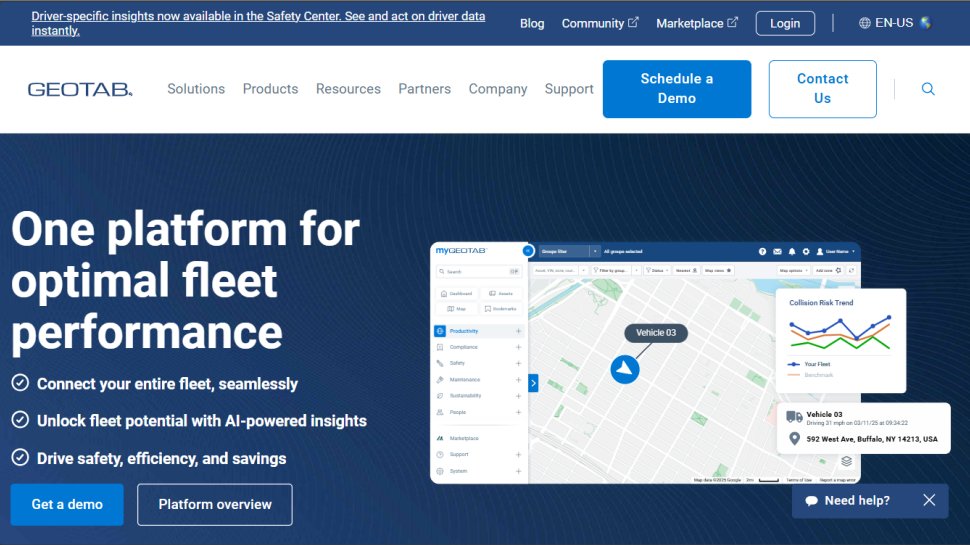
Reasons to buy
Reasons to avoid
Well over two million connected assets make Geotab one of the biggest monitoring companies in the world. You must get in touch with an authorized reseller because the price is determined by vendors. Fortunately, there are four different plans offered, so you may easily choose one that fits your needs.
GPS tracking, vehicle identification number (VIN), driver ID, and input/output expander (IOX) networking are all included in the Base package. Everything you require to maintain compliance with drivers, such as Hours of Service and International Fuel Tax Agreement (IFTA) data, is added by a regulatory plan. The Pro and Pro Plus plans, on the other hand, include engine data in addition to active tracking (1s), lifetime warranties, and superior support.
Because MyGeotab is a cloud-based FMS, it can be accessed from any web browser on any device with any operating system. All of the relevant data, including vehicle position, speed, fuel usage, driver scorecards, productivity, and more, are gathered on the dashboard in a single, user-friendly interface. Element placement is flexible, allowing for a high degree of customization.
The marketplace on Geotab, which offers hundreds of third-party apps and extensions to maximize the use of your Geotab hardware and FMS, is one of its most helpful aspects. Make use of advanced analytics and driver scorecards, add AI and machine learning to dash cams, leverage extensions from engine and vehicle makers for the most practical integration, and many more.
Direct user support is not offered because resellers deliver Geotab's goods and services. As a result, you will be dependent on your vendor for direct support, so make sure their customer service meets your needs. There is also a support center with content for issues that can be addressed via a self-help option.
Read our full Geotab review.
Best fleet management software for diverse assets
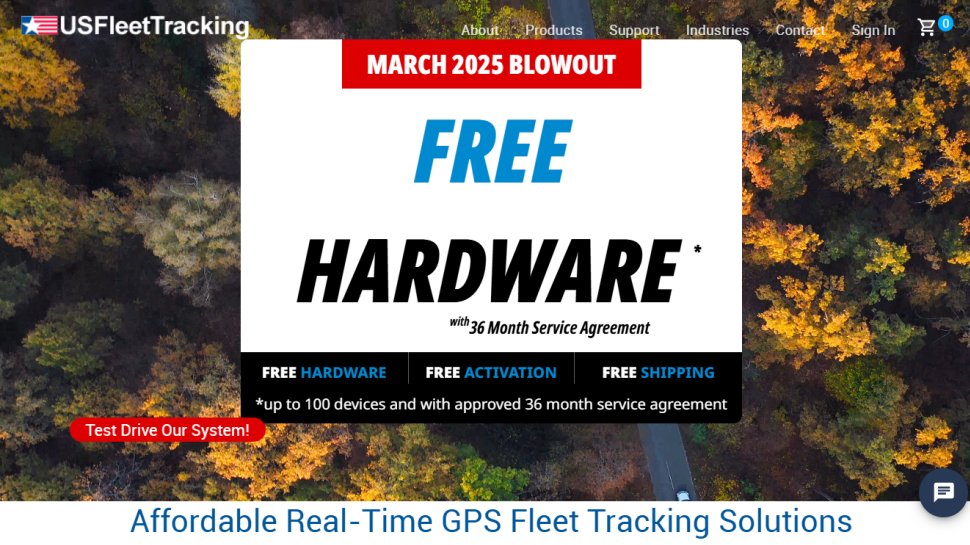
Reasons to buy
Reasons to avoid
With operations in more than 150 nations, US Fleet Tracking is the perfect answer for companies with mobile assets spread across numerous nations. On the other hand, small firms with just one car can easily find the answers they’re looking for because the pricing structure is simple and reasonable.
Plans come without contracts, which is a unique edge over its rivals. For various sorts of vehicles, US Fleet Tracking offers a comprehensive selection of GPS trackers with features like wired or wireless operation, a tough and waterproof casing, and more.
US Fleet Tracking isn't an FMS in the strictest sense as it doesn't offer extensive analytics, like those provided by competitors, because it wants to keep its rates low and its product uncomplicated and easy to use. Nevertheless, there are more than enough essential features, including geofencing, maintenance notifications, ignition, speed, and idle alarms.
Support is accessible from 7 AM to 7 PM CST on Mondays through Fridays and 9 AM to 4 PM CST on Saturdays. However, a lot of simple questions can be answered via self-help content, without the need to call or chat online, thanks to the website's comprehensive knowledge base, video tutorials, FAQs page, and user manuals.
Read our full US Fleet Tracking review.
Best fleet management software for new users
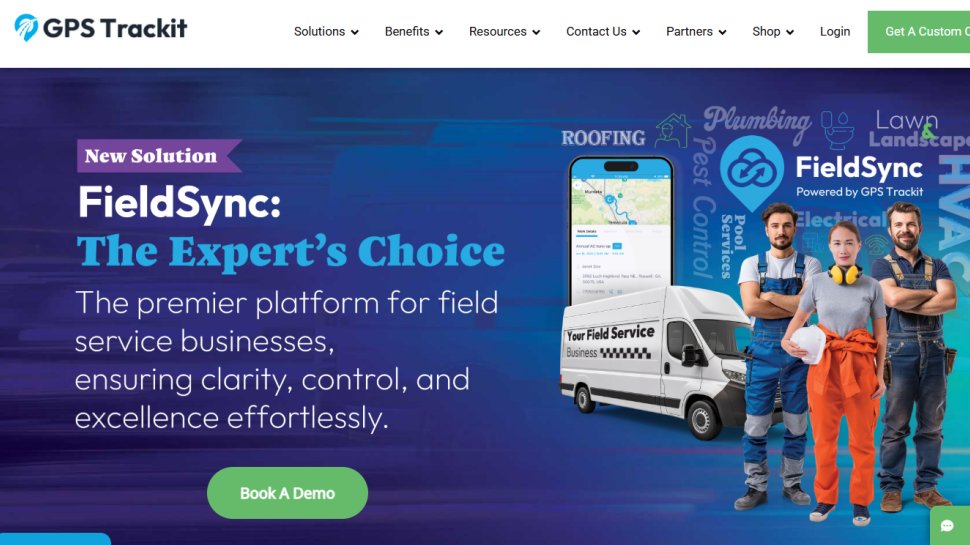
Reasons to buy
Reasons to avoid
GPSTrackit is a sizable and seasoned tracking business with over 12,000 fleets supplied to date. The company has a lot to offer in terms of fleet management, including ELD compliance, safety features, and vehicle diagnostics, as well as free training and hardware, despite its low cost and straightforward payment system. It is simple to understand why this is one of the most well-liked FMS products available.
Its cloud-based software has a ton of fantastic features, such as route planning, tracking, optimization, two-way communication, form creation, and data gathering, that minimize paperwork. Businesses may reduce fuel expenditures, cut down on idle time, and even lengthen the life of their vehicles. With alarms for speed, forceful braking, geofencing, and unauthorized use, the tracking speed is substantially slower (at 30s or 60s) than that of competitors.
With regard to analytics and reporting, this is one of the solutions that is most basic and reasonably priced. In addition to 24/7 phone and email customer service, support features also include an excellent free and unlimited training offering.
Read our full GPSTrackit review.
Best fleet management software for small business
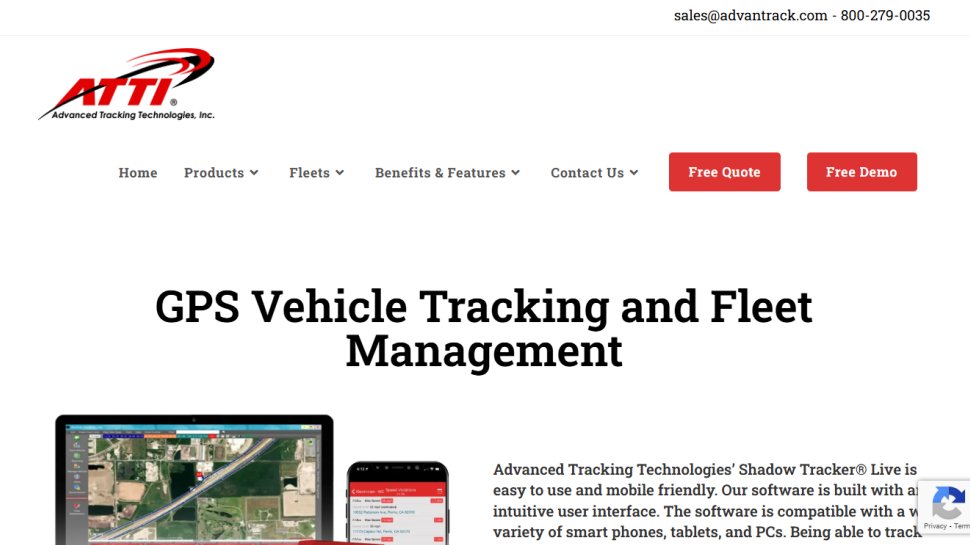
5. ATTI
Reasons to buy
Reasons to avoid
With trackers for both company vehicles and unmanned movable assets like shipping containers, ATTI provides conventional GPS fleet tracking. The user-friendly program enables the generation of numerous reports that save fleet costs and fuel usage, enhance productivity and routing, cut down on overtime, and manage maintenance plans.
The Shadow Tracker® Vision IV GPS unit is a great tracker for mobile assets with hydraulics or other moving parts because it features 10-second updates, internal battery and cellular backups, and built-in power take-off (PTO) monitoring. Furthermore, it is relatively simple to install, although there are reports about some competitors' wireless trackers being an easier install.
The geofence function, which enables users to specify an approved usage region and receive notifications when vehicles cross the fence, deserves special attention. Administrators can define forms or provide a broad radius to include highways, bridges, and other structures.
Although there is no FAQs page or knowledge base on the website, support is available by phone or email from 8 AM to 5 PM CST on Mondays through Fridays.
Also consider:
InSight Mobile Data offers an exceptional fleet management and telemetrics solution, that's relatively affordable and has great customer service and a powerful and intuitive user interface.
Quartixprovides straightforward yet effective fleet management features, including real-time tracking as well as data gathering and analysis.
FleetGO offers an impressive level of customization and granular details on your fleet, but its online presence needs fresh content and better training material.
Fleetio offers a comprehensive fleet management solution that lets you track almost everything in terms of your moving assets.
Geotab offers an impressively versatile fleet tracking solution, albeit lacking transparency in pricing.
Read up on everything you need to know about fleet management.
Best fleet management software FAQs
What is fleet management software?
Businesses can manage, arrange, and coordinate the use of cars and other movable assets like cranes and freight containers thanks to fleet management software (FMS). GPS trackers, which are mounted in vehicles totransmit position data and other metrics like speed and engine status, make this possible.
FMS gathers and presents this data, providing businesses with a clearer perspective of their operations. As a result, firms are better equipped to decide how to dispatch cars, plan routes, distribute loads, plan maintenance, and guarantee driver safety.
Numerous industries make use of FMS. For instance, it helps airlines plan flights, taxi services dispatch vehicles, construction firms track trucks, rigs, and cranes, the food and beverage industry move food promptly and safely, governments and schools oversee bus and public transportation, and so on. Using the appropriate FMS will probably enhance your operations if your company uses automobiles or other mobile assets.
How many vehicles do I need to have before considering FMS?
FMS has proven effective for companies with as little as one or two vehicles, but any business with three or more mobile assets is highly likely to see a significant benefit. This is due to the fact that managing a fleet gets exponentially more challenging as the number of cars or assets rises.
FMS may come at a cost, but it also offers a significant possibility for lowering costs, boosting productivity, and improving customer service in general. The majority of FMS customers discover that the savings considerably surpass the expense.
FMS also provides the benefit of ensuring your operations are fully legal and compliant with state and federal regulations for driver safety (see below).
Finally, making an investment in FMS now will enable scaling your business operations more easily in the future. Starting early with a solid FMS will be advantageous if expansion is your objective and if you intend to increase the number of vehicles in your fleet. By doing this, you'll be able to have policies in place as soon as possible and start planning your operations using fleet data.
Fleet management systems: 10 best features and benefits
GPS vehicle tracking
GPS trackers are an essential feature of any fleet management system. The best GPS trackers allow users to see the location of their mobile assets at any time, anywhere in the world. Faster update speeds enable more powerful analytics, while satellite GPS, although slower than cellular, is more reliable in rural areas.
Driver tracking
Driver IDs and tracking can help you keep track of aggressive driving, unnecessary idle time or stops, recurring distractions, and more. This also helps you ensure that all driver's licenses are valid, compliant, and correct for the vehicle type.
Real-time notifications
Alerts for speeding, accidents, engine problems, route divergence, geofencing, and more can help you improve your fleet management, reduce costs, and improve driver behavior.
Route optimization
Route optimization is one of the most effective ways to improve efficiency and reduce costs. This is done by finding the best routes based on multiple vehicle locations, which reduces travel time, idling, and even overtime.
Dispatching
Communicate quickly and effectively with drivers to send new job information, scheduling, pickup or drop-off locations, geofencing updates, and more, so that you can serve more customers with more efficiency and in less time.
Reporting
Reporting is essential for fleet management. It helps to improve efficiency and safety by providing insights into fuel usage, driver behavior, and vehicle performance.
Fuel efficiency
Vehicle trackers that connect wirelessly or through an on-board diagnostic (OBD) II port can provide you with information on tire pressure, engine efficiency, and more; all of which can help you save money on fuel.
ELD compliance
Electronic Logging Devices (ELD) compliance is a mandatory regulation that makes it easier to track, manage, and share drivers’ Records of Duty Status (RODS), ultimately creating a safer work environment for drivers.
Vehicle maintenance
Reduce the risks associated with having two or more cars out for service at the same time. Also, keep an eye out for recurring, unforeseen maintenance as assets deteriorate to prevent further breakdowns or accidents.
Driver safety
React to any breakdowns and accidents in a prompt and suitable manner anywhere in the world. Send rescue vehicles, get in touch with the emergency teams, and make sure the incident is properly reported for insurance claims.
If I get FMS, am I automatically ELD compliant?
Despite the fact that many FMS solutions provide built-in electronic logging device (ELD) compliant features, not all of your operations will necessarily comply with the requirements of the most recent 2017 mandate. RODS can be shared, maintained, and organized with the aid of FMS, but you also have additional responsibilities. For instance, you still need to make sure that managers and staff are following policies that are influenced by ELD data.
Fleet management costs
Although there are certainly exceptions, you typically pay for hardware up front and software on a monthly basis. Also keep in mind that in some cases GPS trackers are free with a one-year subscription reducing the upfront cost.
In general, GPS trackers cost between $99 and $399, depending on the source. Of course, you don't have to purchase the same tracker for each car you own; instead, you may choose from a variety of trackers with varying price tags to meet your fleet's tracking requirements.
In terms of software, it's pretty common to have to get in touch with a representative for a quote due to the details of fleet management and the variety of aspects offered.
FMS typically costs $20 to $30 per vehicle every month, however there are some outliers and suppliers can be amenable to negotiations.
Which of the best GPS trackers is right for me?
The majority of FMS suppliers provide a range of trackers. Keep in mind that low-cost trackers often transmit less frequently and are well-suited to vehicles that tend to remain on a given spot for extended periods of time, like construction equipment. Advanced models will have speed notifications and geofencing, which is helpful for delivery and taxi services.
Although wireless and battery-powered trackers are often more expensive, they are an attractive option for companies that use a variety of cars since they offer easy interoperability.
How we tested the best fleet management software
Our choice of which fleet management providers to highlight was influenced by a number of important aspects. In order to determine which providers are appropriate for different budgets depending on various features and trackers, we first looked at cost. This enables us to give you the service that best suits your requirements without going over budget.
Following that, we contrasted important aspects like route optimization, driver profiles, and safety measures as well as special and practical extras like dashcam integration, geofencing, and employee time management for simpler payroll processing.
Finally, we examined the various customer service and support options. This involved reaching out to user support, in an anonymous manner, to learn more about their expertise, responsiveness, and overall friendliness.
Read how we test, rate, and review products on TechRadar.
Get in touch
- Want to find out about commercial or marketing opportunities? Click here
- Out of date info, errors, complaints or broken links? Give us a nudge
- Got a suggestion for a product or service provider? Message us directly
- You've reached the end of the page. Jump back up to the top ^
Are you a pro? Subscribe to our newsletter
Sign up to the TechRadar Pro newsletter to get all the top news, opinion, features and guidance your business needs to succeed!
Christian is a freelance writer and content project manager with 6+ years' experience writing and leading teams in finance and technology for some of the world's largest online publishers, including TechRadar and Tom's Guide.
- Pam BarrometroEditorial Assistant

